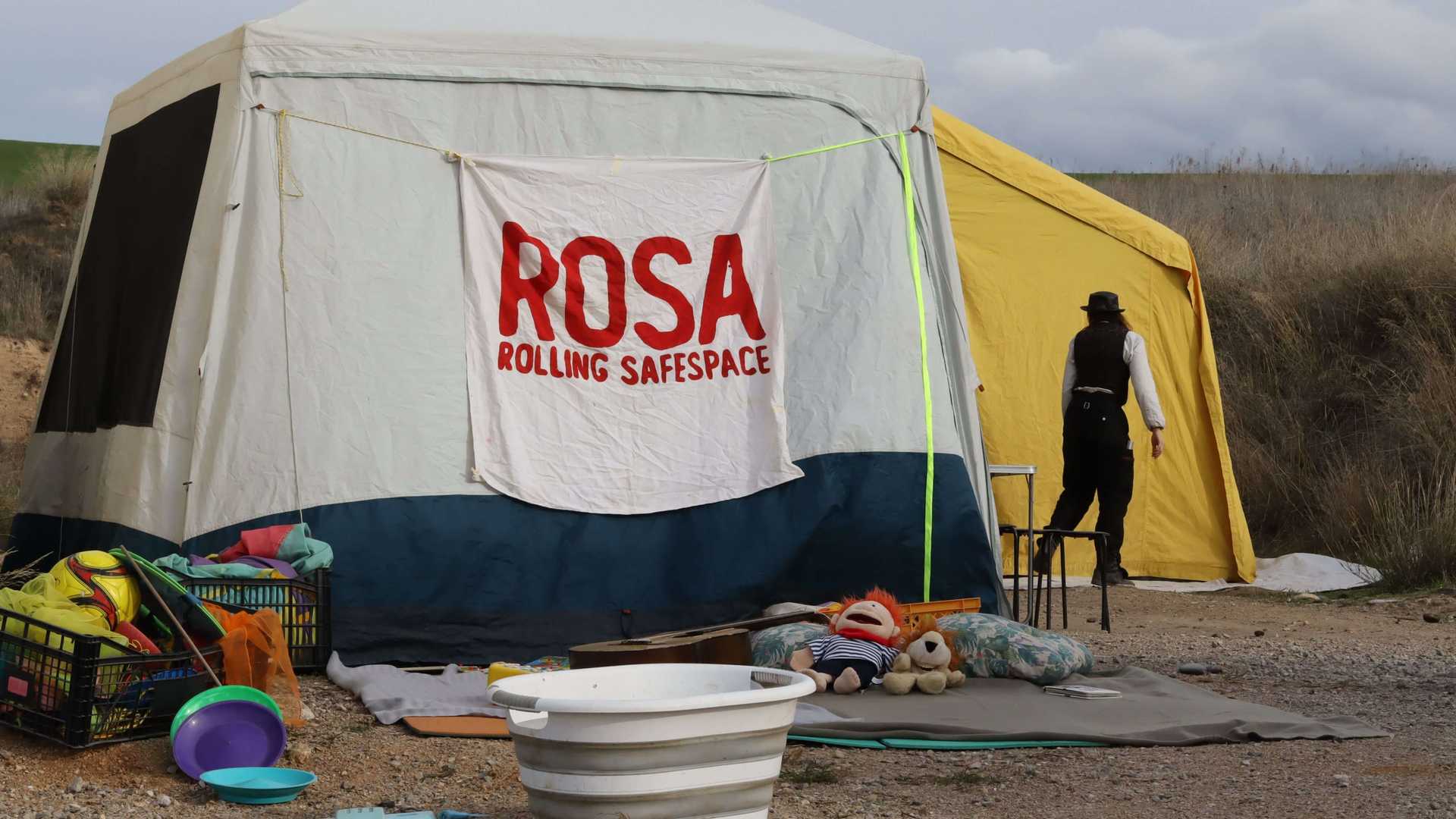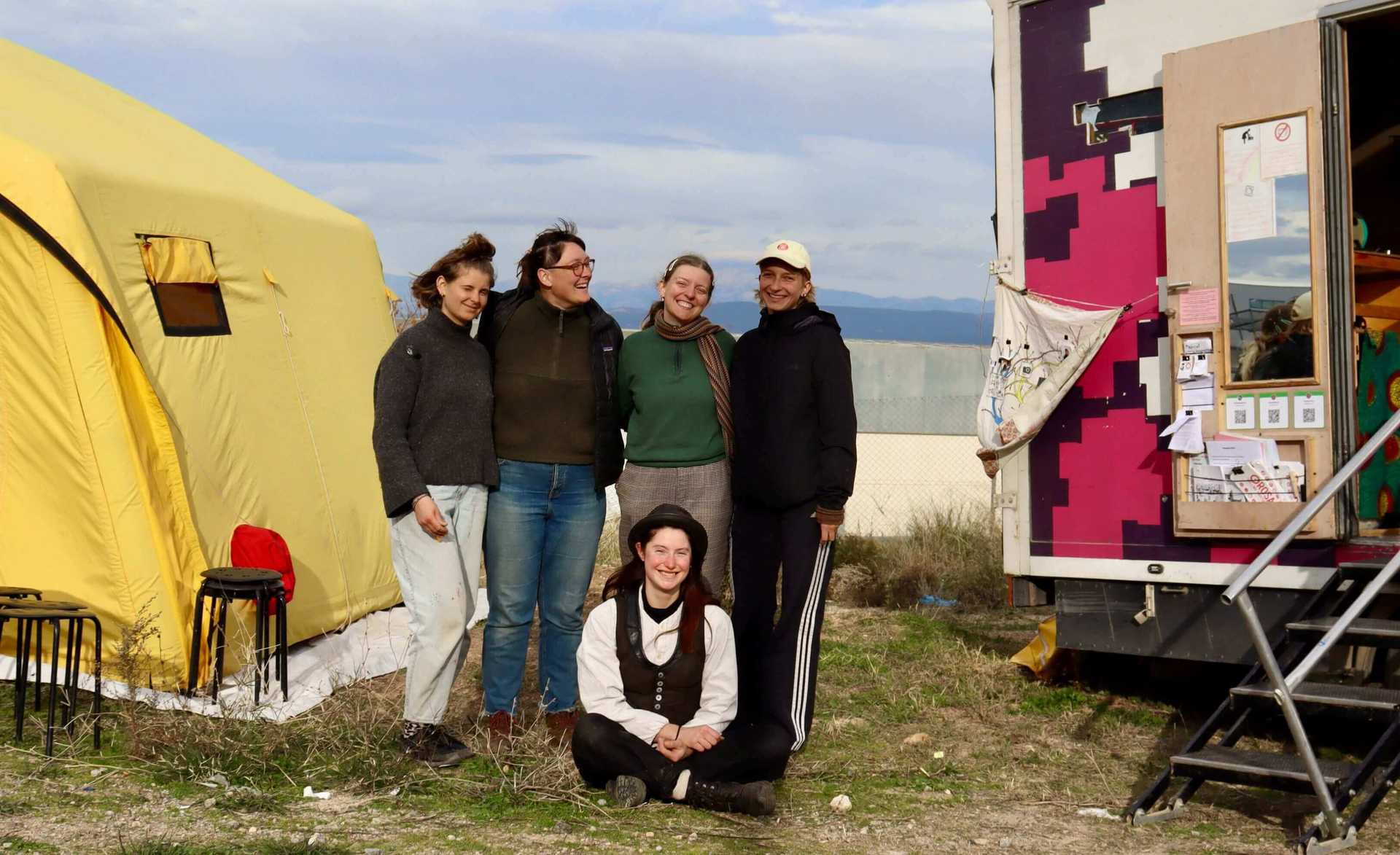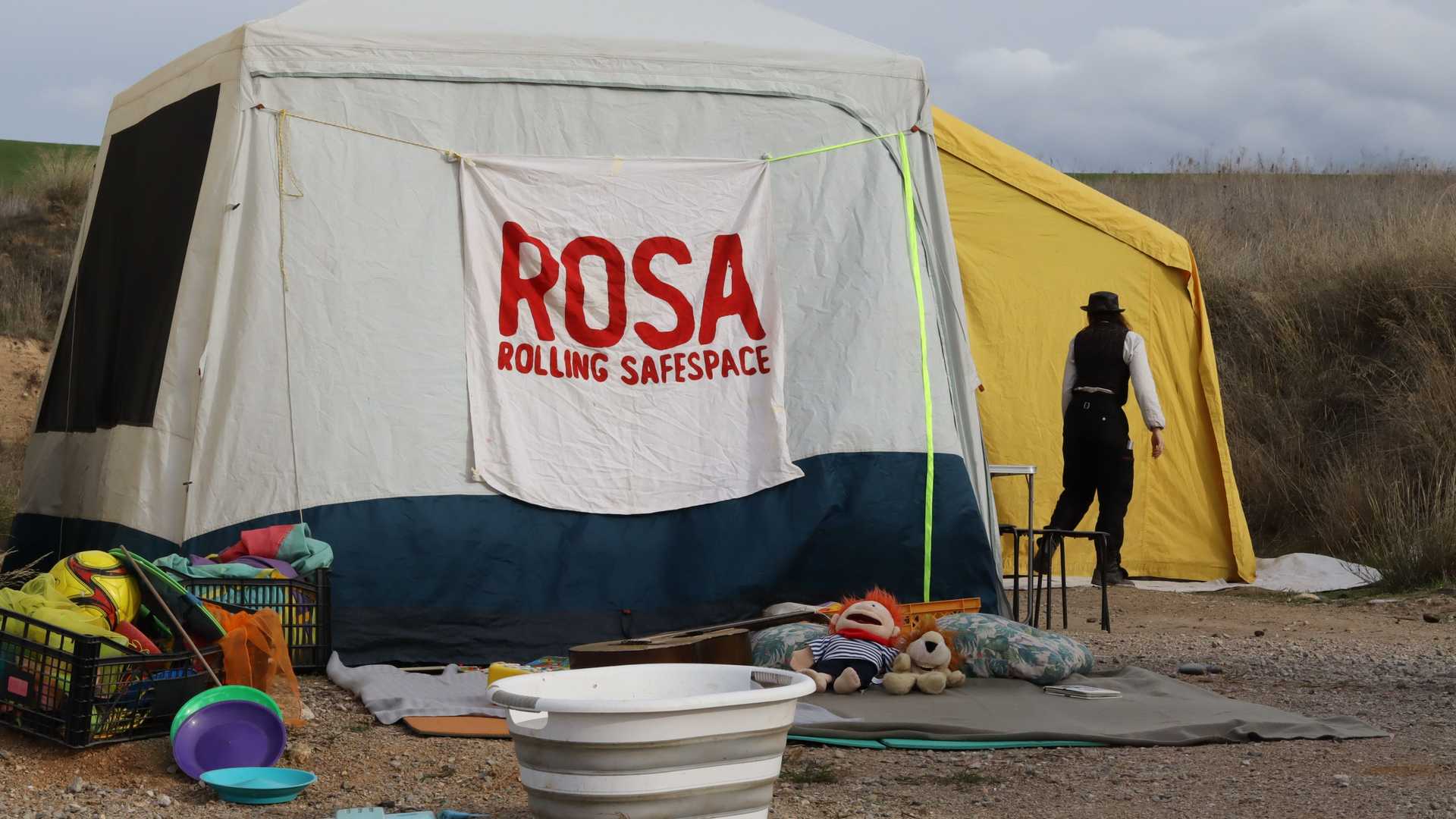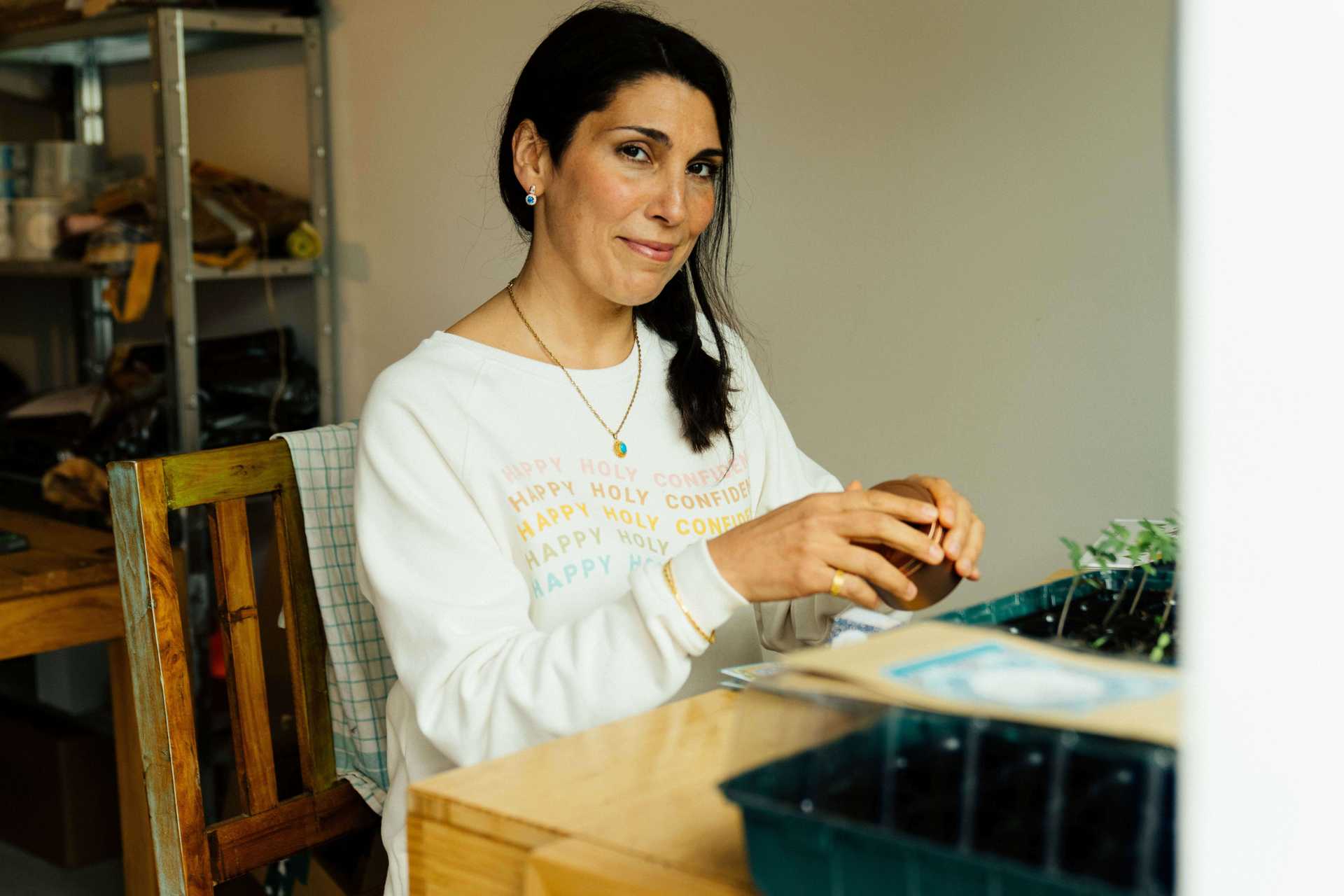“Though you may feel far away from the cities and any help, we want to tell you that you are not alone! Never forget that despite all the horrors you may have lived through until now, you had the strength to survive and to arrive here. We believe in you. ”A booklet by the NGO welcome2europe, used by ROSA
ROSA on the move: A truckload of hope for women in crisis
Our Allianz Foundation Fellow Anuscheh Amir-Khalili will be writing for us in the coming months. She will be reporting on her travels as part of the Fellowship and her visits to her partner projects. She starts with a report on ROSA, a self-organized NGO from Germany, that provides safe spaces for women on the move.
April 2, 2025

A text by our Allianz Foundation Fellow Anuscheh Amir-Khalili
It is the morning after December 21, 2024, and many people with Zoroastrian roots have just celebrated Yalda Night*: the night when light replaces darkness. Following Yalda Night, the days begin to get longer again. This important time of the winter solstice is all about light, love, friendship, kindness and compassion.
I am driving along serpentine roads in the northwest of the Greek peninsula of Attica. The sun is shining, the sky is cloudless and brilliant blue. Through half-open windows, the smell of Mediterranean plants drifts in, mingled with the cooing and chirping of birds. As my gaze repeatedly wanders to the shimmering turquoise sea, I catch myself thinking: “Wow, this is beautiful!”
But then I snap out of it.
The Mediterranean.
For so many people, it has become a graveyard for their loved ones, a site of trauma on the road towards hope. A detour away from another nightmare. With this sobering realization, the weight of knowledge rushes in like a wave:
To know that many women suffer severe burns on their legs from sitting for hours in gasoline-soaked boats, holding their babies aloft to shield them from the corrosive slurry.
To know that these same children may one day shiver at the sight of water—of the shimmering turquoise Mediterranean—paralyzed by the fear inherited from their mothers.
To know and witness how these children tremble and cry, unable to summon the courage to walk past the guards at their container camps.
To know that, in winter, clad only in slippers and T-shirts, they endure the biting cold.
But still, they want to stay.
With ROSA.
Safe spaces for displaced women
ROSA is a self-organized NGO founded by activists in Germany in 2021. They provide a mobile contact point for refugees in Greece's isolated camps. As “Rolling Safespaces,” they offer a form of feminist humanitarian aid that creates protected environments wherever the need is most urgent. These spaces are specifically tailored to address the unique challenges and burdens faced by women on the move. Several days a week, the ROSA team visits the remote camps in Ritsona, Thiva, Malakasa, and Oinofyta, traveling in a converted truck accompanied by an additional van.
The truck is equipped with a room for medical consultations, a kitchenette, and storage for workshop materials. The van, called the “raisin,” carries large inflatable tents, pavilions, workshop supplies, and a variety of children´s toys.
I join the Crewis - as the team members call themselves - over several days and witness firsthand why the children arrive before activities even begin and linger long after everything is packed away:
Because here, they can simply be children. They play with toys, experiment with coloring, or kick a ball around. But above all, it’s a space where, even as they seem to disappear into their drawings or while playing hide-and-seek under blankets, they glance at their mothers and see them being treated with dignity and humanity. Here, they finally hear kind, welcoming words instead of being judged or devalued.
Quote: “The children arrive before activities even begin and linger long after everything has been packed away:” – Anusheh
In the Medispace, a dedicated room within the ROSA truck, the mothers have the chance to speak openly. Beyond the fundamental human right to medical care, something equally profound happens here: they are heard. The ROSA activists carefully choose their words - not to provoke further fear - but to empower and reinforce the courage these women have brought with them.

The Crewies © Anuscheh Amir-Khalili
Solidarity in Isolation
A multilingual booklet titled “Information - for Refugee Women in Mainland Greece” from the NGO welcome2europe is available in the ROSA truck.
I open it and read:
“Though you may feel far away from the cities and any help, we want to tell you that you are not alone!“ (…) “Never forget that despite all the horrors you may have lived through until now (...), you had the strength to survive and to arrive here. We believe in you.”
I see:
Barbed-wire fences enclosing the container camps, surrounded by noisy, bustling roads running in front of them, alongside them, and behind them – isolating people from urban infrastructure.
These are places that would fade into obscurity if not for activists like the ROSA team who made it their mission to be present.
I see their work— their care work - unpaid, often self-funded. Activists cover their own travel costs to Greece, their meals, and more. They do so out of a belief in humanity and solidarity. I see young people leaving the comfort of their homes to support those forced to flee theirs.
For people like Samiye (name changed), with whom I have a long conversation. Samiye is from Kabul, Afghanistan, and fled with her five-year-old daughter. She had previously tried to build a new life in Iran - a country where Afghan children are forbidden from attending school and where daily humiliation is a harsh reality for Afghan women. She stayed until her desperation became overwhelming, and she embarked on the long and perilous journey to Europe.
Kabul. Daughter. Woman. Life. Education. Stoning.
Europe - and Germany, in particular - bear significant responsibility here.
And the women bear a heavy burden on their shoulders and carry immense fear in their hearts, the kind of fear that drives them to risk everything - to climb into a boat in the dead of night, braving storms, in search of hope.

One of the ROSA tents © Anuscheh Amir-Khalili
Everyday Life at ROSA: Creating Spaces for Humanity
The women activists at ROSA - including doctors, midwives, and craftspeople - do not know each other at first. Most of them rotate every five to twelve weeks. They live together in a rustic Greek house situated on a large plot of land surrounded by mountains and fields. The house provides space for sleeping, cooking, and the chance to sit outside, share meals, and laugh together.
The crew’s daily schedule is meticulously planned down to the smallest detail: Who is responsible for what? When is the check-in? When do we set off? Who takes on which role? Are there fires in the area? Are there weather warnings? Who handles the setup and dismantling? Who drives which van? Who speaks to the guards or the police? Who with the men? Who welcomes the new arrivals at the camps?
The structured planning helps the crew focus on what truly matters: holding everything together and providing the women and children with a few precious hours of care and compassion. Beyond access to medical advice, the women also receive legal information - access that can be life-changing in a country where the chances of refugees being granted the right to stay are less than 0.1 percent.
Even after the crew finishes their day at one of the camps, the work is far from over: items from the vans must be unloaded, some cleaned or dried. The trucks need to be unloaded, reorganized, and readied for the next day. The team also connects with the ROSA crew in Germany (where local groups now exist) to share updates and reflect - often working late into the night.
On the winter solstice of Yalda Night, thoughts turn to family and loved ones who have passed away. People remember dear family members who are no longer with them. At the same time, the night symbolizes the birth of light, a beacon of hope.
It is also a time to make plans for the new year: “Solidarity with women on the move and all those standing with them and in memory of those who didn`t make it!” (From the booklet “Information - for refugee women in mainland Greece”)
*Yalda Night is an ancient Iranian festival celebrated on the “longest and darkest night of the year” in Iran, Kurdistan, Azerbaijan, Tajikistan, and Afghanistan.
Our fellow, Anuscheh Amir-Khalili, is a passionate anthropologist and women’s rights advocate who explores the interconnectedness of people, communities, and nature. In her quest for healing alternatives to patriarchal structures, she founded Flamingo, an NGO that has created a network offering refugee women and children safe spaces for trauma recovery and personal growth.
We will be publishing more texts by Anuscheh here in the coming months.
Here you can find more information about Anuscheh's work.
